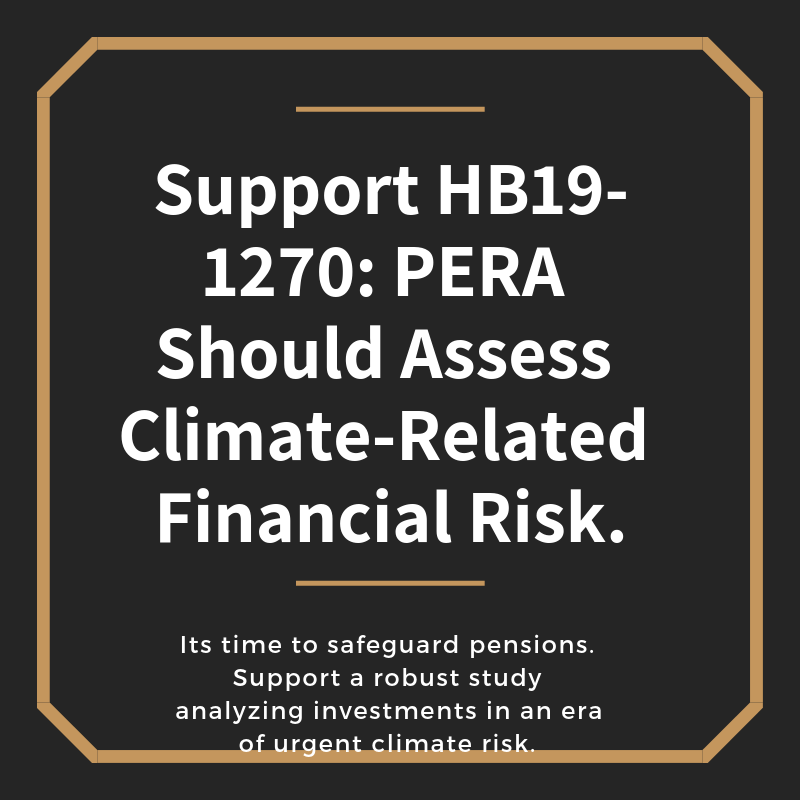 Today HB19-1270, PERA Public Employees’ Retirement Association Board Assess Climate-related financial risks, was heard by the House Finance Committee with five panels of people speaking in support of the bill and only Ron Baker, Director of PERA, speaking against. The House Committee nonetheless voted against moving the bill forward, siding with PERA’s position that they are already adequately assessing climate-related financial risk.
Today HB19-1270, PERA Public Employees’ Retirement Association Board Assess Climate-related financial risks, was heard by the House Finance Committee with five panels of people speaking in support of the bill and only Ron Baker, Director of PERA, speaking against. The House Committee nonetheless voted against moving the bill forward, siding with PERA’s position that they are already adequately assessing climate-related financial risk.
The below remarks were made in support of the bill by 350 Colorado, highlighting how the proposed study would have presented an opportunity for PERA to take its assessment of climate-related financial risk to the next level – and also for Colorado to lead in this space.
It is becoming increasingly clear that climate change and the global responses to climate change will have significant impact on all levels of our society, including pension funds. Already more than 140 pension funds globally have moved to take action to address climate risk, many choosing to actively move investments away from fossil fuels in anticipation of continuing global trends to address climate change.
There is consensus within the scientific community that increasing global temperature by more than 2 degrees will likely cause devastating and irreversible damage to the planet. At least two-thirds of fossil fuel reserves will not be monetized if we are to stay below 2 degrees of warming, which will create stranded carbon assets. Stranded asset estimates range from $304 Billion – an estimate by the International Energy Agency happening as soon as 2035 – to $100 Trillion, also by 2035. This is right around the corner. Let me say that again. Experts are estimating that within 15-20 years there could be $300 Billion to $100 Trillion dollars worth of stranded assets. The question is: who will be left holding the bag?
Most have concluded that the way of the future is to transition from fossil fuels to renewables, and this transition is already underway. With the number of new climate related regulations, emerging technologies and announcements of new climate litigation, the economics of traditional carbon-intense industries will most surely continue to shift. Already, we see the changes afoot. Advances in technologies for energy efficiency and renewable power, and the accompanying drop in their price, have made low-carbon energy much more economically and technically attractive.
In this context, it is reasonable to expect that the fossil fuel industry will experience a significant decline in the near future, as has already happened in the coal industry. Fiduciaries who have retained exposure to the fossil fuel industry when this happens will fall under heavy scrutiny. Former SEC Commissioner Bevis Longstreth says, “At some point down the road towards the red light of 2 Degrees Centigrade, it is entirely plausible, even predictable, that continuing to hold equities in fossil fuel companies will be ruled negligence.” Already in the UK, lawyers are advising trustees that pension funds are at an increasing risk of litigation if trustees fail to develop their approach to climate risk in line with improving data and market practices.
While PERA may already be reporting on elements requested in this new study through its Stewardship Report and other mechanisms, (and I want to personally thank PERA for the leadership it has taken to date on these issues), this bill allows for an even more robust analysis of PERA’s holdings, in particular fossil fuel holdings. The proposed study, if done well, can serve to accelerate PERA’s efforts to lead in this space, and will inform next steps. Furthermore, this additional study invites PERA further on the path to most responsibly responding to climate risk and taking subsequent actions to respond in a timely way to climate-related threats.
Thank you for your time and consideration. Please vote in support of this additional study which will serve to increase information and analysis, and will also offer new perspectives in considering this most critical issue of our times.
*Want to learn more? Visit www.FossilFreeCOPERA.org to learn about the growing coalition advocating for divestment and changes in PERA’s investment practices. Contact Deborah at campaigns@350colorado.org to join the conversation with other PERA members working on this issue.
—–
For Further Reading:
Divestment 101: 10-point FAQ primer on a new mindset around energy sector holdings
Carbon Bubble Could Spark Global Financial Crisis
IEEFA Update: 2018 Ends with Energy Sector in Last Place in the S&P 500
In Response: Colorado’s PERA Shouldn’t Bank on the Future of Oil and Gas
